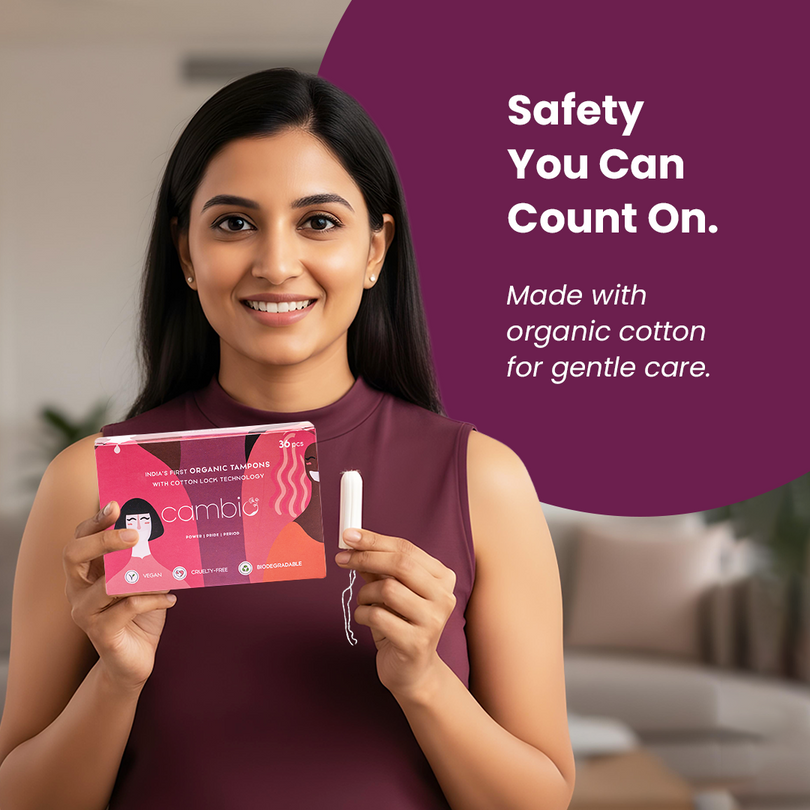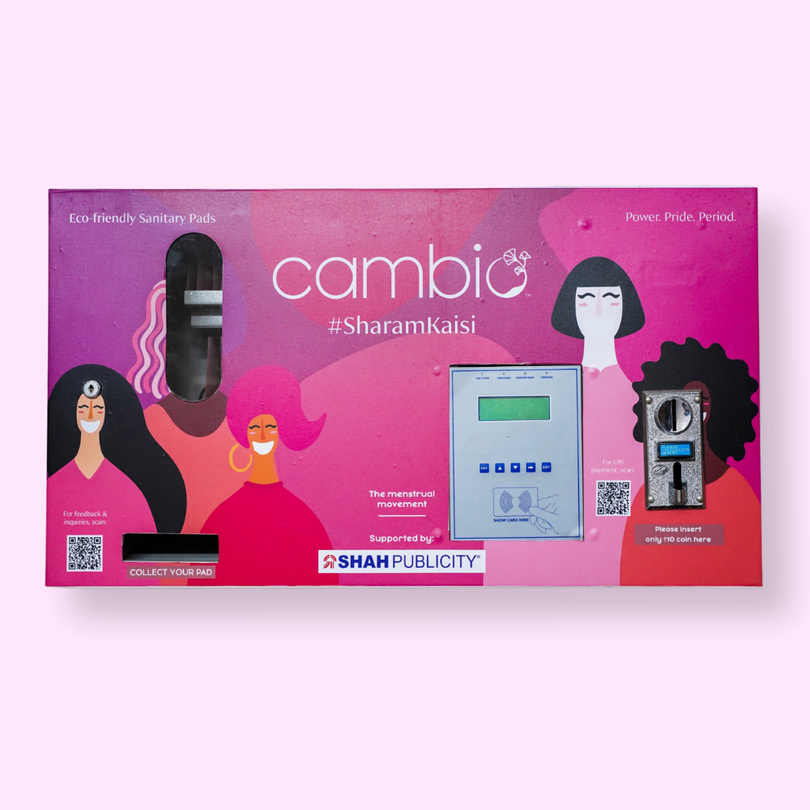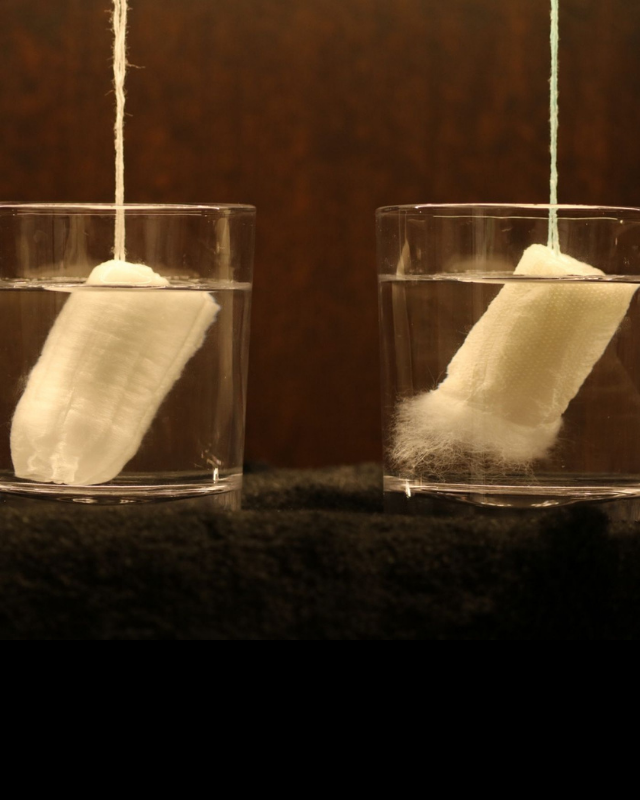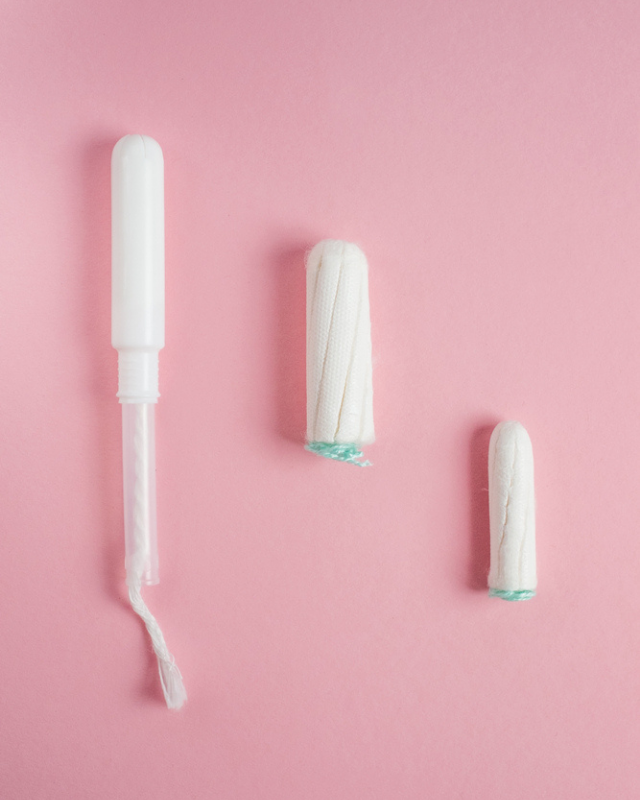Long ago, menstruating women prayed to God to send them some solace amongst bleeding, cramps and messy period experiences.
And lo! Soon, a tampon was laid safely into their menstrual care basket!
Defining an organic tampon is pretty simple. It’s similar in design to regular tampons but is much better than them in sustainability, reproductive health and convenience.
Generally, Menstruators prefer tampons over other products for period care as they are easy to carry, hassle-free and very discrete while changing period products, which makes it like a secret agent with the critical mission to protect you!
Moreover, it directly absorbs the blood within the vaginal canal, avoiding leakages or stains on the garments.
But wait, don’t we get cheaper and long-lasting tampons readily in the market at a fraction of the cost?
Nope.
It's time to unveil the ugly truth behind regular tampons and why it's high time to make the switch to organic care.
Regular Tampon vs Organic Tampon
Regular Tampon
Conventional tampons are often made from synthetic materials like rayon and polyester, which can introduce unwanted chemicals and toxins into your intimate space.
They are made of viscose material, often covered with a plastic sheet to prevent fibres from getting dislodged in your vaginal canal.
However, such plastic covering is not present at the tip of the product, posing a risk for loose fibres that serve as a breeding ground for future infections.
Not to mention, they may also be bleached with chlorine, leaving behind residues that can disrupt your delicate pH balance and cause irritation.
Synthetic Tampons also increase the risk of TSS (Toxic Shock Syndrome).
TSS is a rare but serious bacterial infection that can occur when certain strains of bacteria multiply to dangerous levels in the body.
Synthetic tampons, with their high absorbency rates, create an environment conducive to bacterial growth.
The fibres of synthetic materials can leave behind micro-tears in the vaginal walls, providing an entry point for bacteria.
But fear not, for organic tampons are here to save the day!
Organic Tampon
Crafted from pure, unadulterated organic cotton, they offer a natural, breathable alternative free from harmful additives.
By choosing organic tampons, you're not just protecting your body from potential harm but also championing sustainability and supporting eco-friendly practices.
It's time to say goodbye to the nastiness of regular tampons and embrace the pure goodness of organic.
Make the switch today and experience a period that's clean and safe but also kind to your body and the planet.
It's time to reclaim your period and indulge in the luxurious comfort of organic tampons. Your body deserves nothing less!
Switching from Commercial, Non-Biodegradable Tampons to Organic, 200% Biodegradable ones come with many fantastic perks!
It's like stepping into a world of pure elegance and luxurious comfort.
Organic tampons are crafted with the utmost care, using 100% certified organic cotton free from pesticides and harsh chemicals.
When you choose organic, you treat your body to a natural and gentle experience worthy of a red-carpet affair.
But the magic doesn't stop there. By opting for organic tampons, you're pampering yourself and embracing a deeper connection with Mother Earth.
These little wonders are biodegradable, meaning they gracefully break down over time, leaving no trace behind.
It's like joining a secret sisterhood with the planet, making a positive impact while looking fabulous.
So, my dear, get ready for a period of experience that's sustainable and empowering.
Using organic tampons is not just a choice, it's a statement.
It's a decision to prioritize your health, embrace comfort, and stand in solidarity with our beautiful planet.
Get ready to unleash your inner confidence and embark on a fabulous journey like no other.
It's time to make the switch and let organic tampons work their magic.
Trust us, you won't look back.
Read more: Tampons vs Sanitary Pads
How to Identify the Right Organic Tampons for Yourself?
First things first, quality is queen.
Look for tampons made from 100% certified organic cotton.
Why?
Because it's the crème de la crème of tampon materials.
Organic cotton is gentle on your delicate skin and free from pesticides and harmful chemicals.
It's like a soft, cozy blanket for your intimate area, ensuring a comfortable and irritation-free period experience.
Next up, we have size matters.
Tampons come in various sizes to accommodate different flow levels.
Whether you're a light flow warrior or a heavy flow conqueror, choosing the right tampons size ensures optimal protection and peace of mind.
It's like finding the perfect fit for your favourite pair of jeans – snug, secure, and oh-so-comfortable.
Now, let's talk about packaging.
Opt for tampons wrapped in biodegradable or compostable materials.
Not only does this minimize environmental impact, but it also adds a touch of eco-consciousness to your period routine.
Plus, it's like unwrapping a little gift whenever you need to freshen up. How delightful!
And let's not forget the applicators. Some organic tampons come with applicators made from plant-based materials like sugarcane or cornstarch.
These eco-friendly alternatives offer smooth and easy insertion, while still ensuring the same level of comfort and protection.
It's like an eco-ninja helping you conquer your period woes.
Last but certainly not least, let's talk about transparency.
Look for brands that are upfront about their ingredients and manufacturing processes.
A company that values transparency is like a trusted friend, guiding you through the overwhelming world of period care.
They provide you with the peace of mind you deserve, knowing exactly what you're putting in your body.
So, there you have it – a guide to help you navigate the wondrous world of organic tampons.
Remember, the power is in your hands (or should we say, your shopping cart?).
Choose quality, size, eco-friendly packaging, gentle applicators, and transparency.
With these factors in mind, you'll be well-equipped to make a choice that aligns with your values and gives you the comfort and confidence you need during your period!
Read more: how to use a tampon?
Bonus Tip
Research and purchase tampons that have “Cotton Lock Technology” that sustainably prevents the fibres from getting dislodged in the vaginal canal.
Ready to embark on a fabulous journey towards organic period bliss?
Look no further!
Cambio Woman is your go-to destination for all things fabulous and inclusive.
Get your hands on the finest organic cotton tampons to make your period feel like a VIP experience.
Say goodbye to synthetic materials and hello to the luxurious comfort of 100% organic goodness.
With the only Tampon brand in India having the Cotton-Lock Technology, Cambio Woman’s Tampons are 100% Biodegradable, Sustainable and Organic minimizing your exposure to several reproductive infections!
What’s more, you get handy disposable bags to manage your menstrual waste responsibly!
Our mission is to empower you to make conscious choices for your body and the planet.
Visit Cambio now and indulge in the ultimate shopping experience that combines comfort, safety, and sustainability. Join our vibrant community of changemakers and switch to organic cotton tampons today. Your period deserves nothing but the best!
Read more: Types of Menstrual Products










